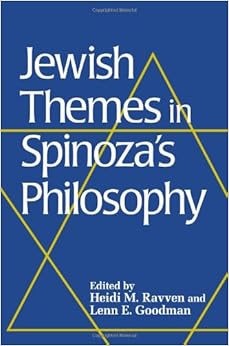Well you may have picked up that while there are two economists, to be precise, political economists, for me i.e Marx and Ostrom, there is one philosopher.
Yes I am finding Spinoza interesting in many ways. He can be seen as a green philosopher, he advocated a democratic republic and sought to look at how religion could be used for social control and how religion based on superstition might be resisted.
His notion of the multitude and common good may have influenced Marx.
I read Heidi Ravven's book on free will which drew heavily on Spinoza, liking her book very much I noticed she had co-edited Jewish Themes in Spinoza's Philosophy. I have read it recently and would recommend it.
Heidi's essay looks at the laws of Moses as a foundation for a democratic, egalitarian state as in inspiration for Spinoza.
Warren Montag's essay hinting at a previously unknown affection on Spinoza's part for the kabbalah despite Spinoza's dismissive comment in the TTP, is another high point.
Richard H. Popkin, in turn argues that Spinoza's excommunication may have been less traumatic than once thought.
All in all a very interesting book, as usual, a bit pricy but worth a library borrow.
Full contents:
1. Introduction
Heidi M. Ravven and Lenn E. Goodman
2. What Does Spinoza's Ethics Contribute to Jewish Philosophy?
Lenn E. Goodman
Part II. Metaphysics
3. Love of God in Spinoza
Lee C. Rice
4. Spinoza's Metaphysical Hebraism or Hebraic Metaphysics
Warren Zev Harvey
5. Maimonides, Spinoza, and the Problem of Creation
Kenneth Seeskin
6. “That Hebrew Word”: Spinoza and the Doctrine of the Shekhinah
Warren Montag
Part III. Theology and Epistemology
7. Maimonides, Spinoza, and the Book of Job
Edwin M. Curley
8. Spinoza's Rupture with Tradition—His Hints of a Jewish Modernity
Heidi M. Ravven
9. Why Spinoza Chose the Hebrews: The Exemplary Function of Prophecy in the Theological-Political Treatise
Michael A. Rosenthal
Part IV. The Historical Setting
10. Spinoza's Excommunication
Richard H. Popkin



No comments:
Post a Comment